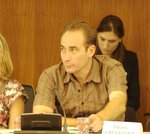Thierry CRUVELLIER
contribution 20 -
CRUVELLIER Thierry

tags
RPF prosecutiontranstlated version
Thank you. Thierry Cruvellier. Well, journalists are used to making fun, but I would like to say thanks this time to Madam Del Ponte and Mr. Roux precisely for what he has just said. I believe that what we need to do is to address this ^internal problem of the international courts is that they are in a political context. So it does not help if we continue to justify failures or issues related to jurisdiction, the common law, civil law dispute. That is not the case.
Yes, let us rehabilitate our policy and see what the ICTR has taught us. We could go further and say it is all very well to acknowledge this and be humble, but what do we learn after that? I would like to better understand why Mr. Goldstone, ^Ms. Arbour, Mr. Jallow, why you have adopted various options and why in the final analysis you all failed? Why could we bring out a better analysis and better explanation why it did not happen as in the other tribunals. Is it possible to prosecute both parties in a situation like that? Is it because you did not have the support of the Security Council, and due to that lack of support you couldn’t go far is? Is that one of factors? Do you know other factors?
And still in the debate, if you were asked, is it because you are dealing with the genocide and that actually hamstrung you because the other tribunals may not have had the specific problem, even though ^Shebenisha was a genocide, but it may have a different name? Is that also a factor? Are we a lot more vulnerable when we are faced with this kind of crime and more unable to have a comprehensive mandate?
I realise that in the issue of Cambodia some may argue that it is a genocide and only one side is being tried and nobody is complaining. I don’t know if that is one of the factors, but what is of interest to me is that if we have to learn lessons from the Tribunal, we should ask ourselves what explains this failure? What prevented you from doing it?
Even when some of you decided not to try anything, why was it so? Maybe we should try to explore this further and move beyond controversy. So Mr. Jallow or Ms. Del Ponte, if you could go beyond that or move further, please do so. That will help us.
Another comment that I heard from the beginning was the absence of international police force. On the contrary, I think we should be happy about the track record of the ICTR and the other international tribunals. None of them has a police force but they prospered, they made progress. I think it is rather a cause for rejoicing that without an international police force you are able to operate. So if we have to work on received ideas that the lack of an international police force as an obstacle to international tribunals, I say no. That has to be established.
J.P. GETTI
Thank you. Madame Condé, you have the floor now.

